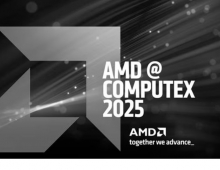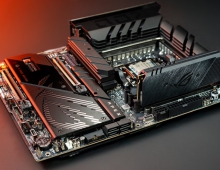
AMD Says CPU Sales May Slump To Single Digits
Annual PC processor sales may slow to "a new baseline" of low second-digit growth long term, said AMD, which reported an 11 percent decline in quarterly sales and expectations of a dip of about one percent for the coming three months.
In what it could be the first signs of the "Post-PC era," AMD reported revenues of $1.41 billion, 11 percent down from the prior quarter and 10 percent down from the same period in 2011. The company reported net profit of $37 million, up from a loss of $590 million in the prior quarter but down from a profit of $61 million in the same period last year.
"We believe the PC baseline may be resetting to a new level," said Rory Read, AMD?s chief executive, speaking on a conference call with financial analysts. "It's clear global economic activity is slowing," he said.
"For the first time since 2001, client PC shipments have declined sequentially for three consecutive quarters-and have been below historical averages for the last seven quarters," Read said during the chip supplier's conference call.
"Overall weakness in the global economy, softer consumer spending and lower channel demand for our desktop processors in China and Europe made the closing weeks of the quarter challenging," said Rory Read. "We are taking definitive steps to improve our performance and correct the issues within our control as we expect headwinds will continue in the third quarter as the industry sets a new baseline. We remain optimistic about our core businesses as well as future opportunities with our competitively differentiated next-generation Accelerated Processor Units (APUs). Our recently launched Trinity APU continues to gain traction with customers. We are committed to driving profitable growth."
AMD also noted a slowdown in consumer notebook sales generally, as well as weak sales for its own resellers in China and Europe.
In the short term, "macro headwinds will continue next quarter." he said. "We expect notebook softness will continue in the second half with growth but at lower rate as buyers anticipate the rolloutof Windows 8 and [OEMs] build inventory," he added.
Read said ARM's progress in client PCs "will be muted for some time" but ARM-based systems could make "significant progress in the 3+ year time frame," he said. Windows-based tablets generally "could enjoy 20 percent market share" within three years, he added.
AMD no longer has any constraints on access to foundry process technology. It expects a new batch of ultrathin notebooks using its processors will ship with Windows 8 in October.
AMD also felt weaker than anticipated sales for server chips, especially for business end users. "We believe Bulldozer will drive modest share growth [in servers in the] near term," Read said.
AMD is shipping its first 28nm graphics processors this year and will ship 28nm PC processors in 2013.
"We believe the PC baseline may be resetting to a new level," said Rory Read, AMD?s chief executive, speaking on a conference call with financial analysts. "It's clear global economic activity is slowing," he said.
"For the first time since 2001, client PC shipments have declined sequentially for three consecutive quarters-and have been below historical averages for the last seven quarters," Read said during the chip supplier's conference call.
"Overall weakness in the global economy, softer consumer spending and lower channel demand for our desktop processors in China and Europe made the closing weeks of the quarter challenging," said Rory Read. "We are taking definitive steps to improve our performance and correct the issues within our control as we expect headwinds will continue in the third quarter as the industry sets a new baseline. We remain optimistic about our core businesses as well as future opportunities with our competitively differentiated next-generation Accelerated Processor Units (APUs). Our recently launched Trinity APU continues to gain traction with customers. We are committed to driving profitable growth."
AMD also noted a slowdown in consumer notebook sales generally, as well as weak sales for its own resellers in China and Europe.
In the short term, "macro headwinds will continue next quarter." he said. "We expect notebook softness will continue in the second half with growth but at lower rate as buyers anticipate the rolloutof Windows 8 and [OEMs] build inventory," he added.
Read said ARM's progress in client PCs "will be muted for some time" but ARM-based systems could make "significant progress in the 3+ year time frame," he said. Windows-based tablets generally "could enjoy 20 percent market share" within three years, he added.
AMD no longer has any constraints on access to foundry process technology. It expects a new batch of ultrathin notebooks using its processors will ship with Windows 8 in October.
AMD also felt weaker than anticipated sales for server chips, especially for business end users. "We believe Bulldozer will drive modest share growth [in servers in the] near term," Read said.
AMD is shipping its first 28nm graphics processors this year and will ship 28nm PC processors in 2013.





















